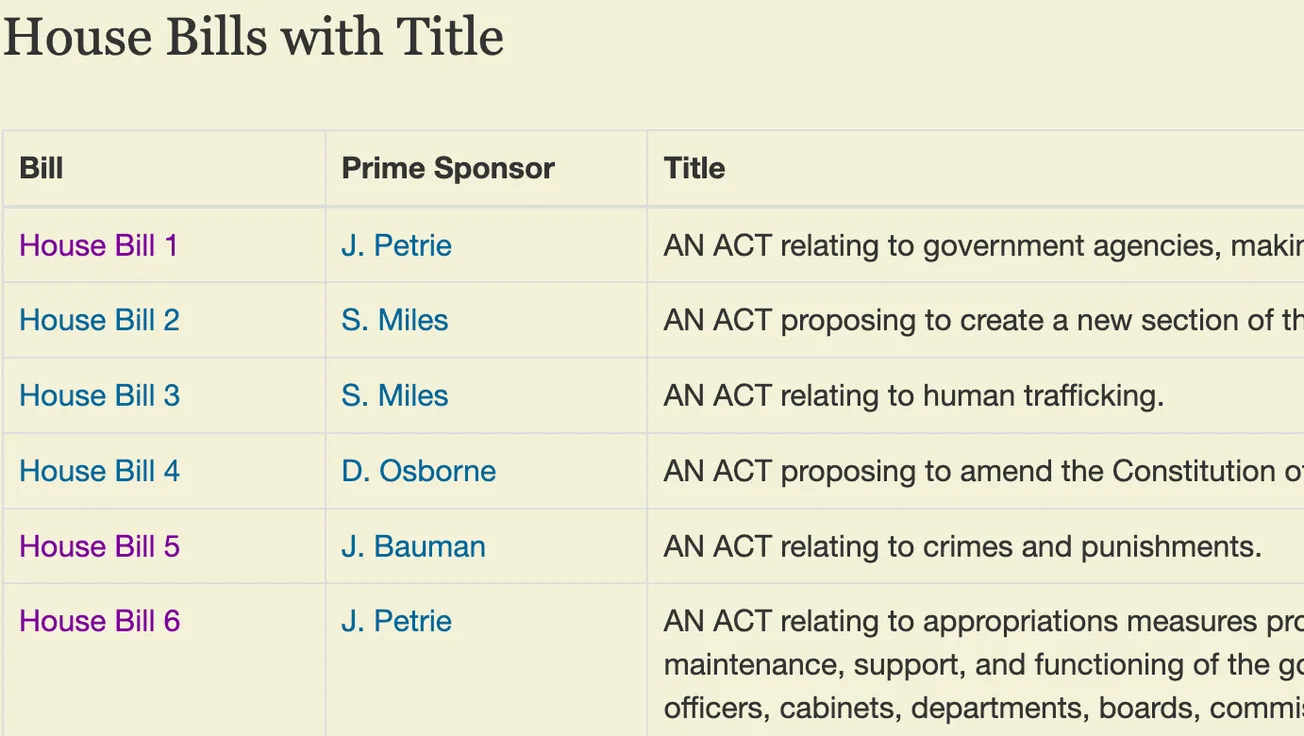A Kentucky bill that would eliminate the governor’s authority to fill U.S. senate vacancies – filed one week before U.S. Sen. Mitch McConnell announced his impending retirement from Republican leadership – is one of five to watch in Frankfort this week.
Other bills expected to come to a vote this week would create a new school safety role for veterans and former police, give pregnant women state-mandated maternity leave for the first time, crack down on abuse of dogs and cats, and more.
Here’s what we know:
House Bill 622 – Process to fill U.S. Senate vacancy
The governor’s role in filling vacancies in either of the state’s two U.S. senate seats would be abolished under HB 622. A special election would be held to fill the seat instead. That’s the same procedure used to fill vacancies of both Kentucky’s U.S. representatives and state legislative vacancies under current state law.
HB 622 was filed for consideration in the Kentucky house on Feb. 21 – six days before McConnell (R-Ky.) announced he will step down in November from his leadership post.
The senator from Kentucky is the nation’s longest-serving U.S. senate leader. He announced his plans on Feb. 27 following two incidents last year (including one in Covington) where McConnell suddenly went silent while speaking to reporters.
McConnell has clarified, however, that he intends to serve out his current term, ending in Jan. 2027.
The sponsor of HB 622 is House Majority Floor Leader Rep. Steven Rudy (R-Paducah). Before the House Elections committee voted to advance the legislation Thursday, Rudy told the committee his bill would make filling of U.S. senate vacancies “like all other legislative vacancies.”
Rudy cited the 17th amendment to the U.S. constitution as a reason behind it. That amendment, ratified in 1913, allows voters to directly elect U.S. senators.
“I think it’s preferred,” Rudy said. “God forbid we have any vacancy in a U.S. senator, I think the people would want to decide who their senator was and not want an appointment.”
HB 622 is expected to come to a vote in the full house on Monday.
Senate Bill 2 – Putting “guardians” in schools
A bill expected to come to a vote in the Kentucky senate would allow military veterans and former law enforcement to become armed guards at public schools, with increased student mental health services included.
The proposed school security detail in SB 2 is the “Kentucky guardian” program. Only recently honorably discharged veterans, retired sworn or special law enforcement, retired Kentucky state troopers, and former federal law enforcement could serve in the role.
Guardians would be tested, trained, and certified to start work beginning in the 2025-26 school year.
The armed guards could be hired (but would not be required) to fill in where there is a lack of school resource officers, or SROs, or at schools where additional security may be needed.
Although state law requires a full-time SRO on each public school campus, SB 2 sponsor Sen. Max Wise (R-Campbellsville) said there aren’t always enough SROs available in his testimony on SB 2 before the Senate Education committee last Thursday. Wise said the bill follows a rise in school violence and disciplinary issues compounded by student mental health needs.
“I don’t know how long I will be in my position as a state legislator but I will tell you this – I will always fight to protect our children in the Commonwealth of Kentucky,” Wise told the committee. “Because when you work on bills like this, and you sit across from parents who have lost a child to a school shooting, this bill is another layer of a security approach to help students.”
Student mental health provisions in SB 2 would require schools to provide two suicide prevention awareness lessons each school year for students in grades 6 through 12. It would also promote interagency agreements between school districts, mental health agencies and other social services, among other changes.
Opponents of the certification of armed guards in public schools said they support the mental health provisions in SB 2 at Thursday’s committee hearing on the bill. SB 2 is expected to come to a vote on the senate floor Tuesday.
House Bill 258 – Make torture of dog or cat a felony
Back in the Kentucky house, lawmakers are also expected to vote on legislation that would make torture or a dog or cat a felony for each and every offense. Rep. Susan Witten (R-Louisville) is the lead sponsor of the legislation in HB 258. There are 23 cosponsors to the bill.
Right now it is a misdemeanor to torture of a dog or cat in Kentucky. That’s for a first offense, with each subsequent offense a Class D felony carrying one to five years in prison.
Every offense would be a Class D felony under HB 258.
The bill defines torture of a dog or cat as “intentional infliction or subjection to extreme physical pain or serious injury or death of a dog or cat, motivated by intent or wanton disregard.” That definition includes — but is not limited to — situations where the animal’s pain, injury or death is caused by “restraint,” including being “locked in a cage or kennel, sealed in a plastic bag or box, chained or tied down to restrict motion,” “abandoned … three days or more with no intention or returning” and being physically restrained with tie wraps, rope, chain or tape.
HB 258 is expected to come to a vote in the full House Monday.
House Bill 581 – Zoning of filling and EV stations
The Kentucky house is also expected to take up a bill this week that would put gas and diesel on equal footing with EV charging stations regarding local zoning rules.
Rep. Ken Upchurch (R-Monticello) is the sponsor of HB 581. It would prohibit local governments from creating zones specifically for EV (electric vehicle) charging. A local ordinance that “discriminates against the use or location of a retail filling station” by treating them differently than EV stations would also be prohibited.
The House Local Government committee approved the bill on Feb. 28. In his testimony, Upchurch said the bill would not interfere with the placement of EV charging stations at private businesses or rest stops. What it would do, he said, is “ensure statewide regulatory consistency in an already highly regulated industry by preventing political subdivisions from adopting or enforcing regulations that limit access to specific fuel sources or prohibit construction of retail fueling facilities.”
HB 581 is one of several bills to restrict local control making its way through the legislative process this session. It comes as Ford Motor Co.’s $5.8 billion BlueOvalSK – twin EV battery plants under construction in Hardin County – prepare to start production in 2025.
Senate Bill 142 – Paid parental leave for state employees
Up to four weeks of parental leave would be provided to state employees after the birth or adoption of a child under another senate bill expected to come to a floor vote Tuesday.
Sen. Amanda Mays Bledsoe (R-Lexington) is the sponsor of SB 142. Should it become law, state employees would receive up to four weeks – or about 30 days – paid leave for birth, surrogacy or child adoption. Two weeks of paid leave would be provided to place a child in foster care or with relatives.
A parent would be allowed to use the leave before using any sick or annual leave or comp time, according to the bill.
A similar senate bill, SB 205, would provide 20 days of paid maternity leave for school employees. Sen. Lindsey Tichenor (R-Smithfield) is the bill’s sponsor, now pending in committee.
--30--
Written by Rebecca Hanchett. Cross-posted from Link NKY.








